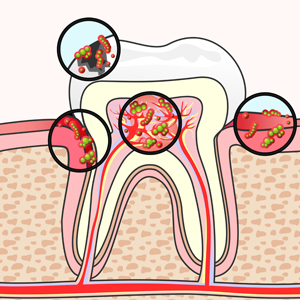 When you have a cold, we all know to cover your mouth before you sneeze and not to drink out of the same glass. We do this because we know that a cold is contagious. Now we know that, chances are, so is tooth decay.
When you have a cold, we all know to cover your mouth before you sneeze and not to drink out of the same glass. We do this because we know that a cold is contagious. Now we know that, chances are, so is tooth decay.
Recent research suggests that the germs responsible for cavities may be “catchy.” Likewise, scientists suspect that bacteria associated with gum disease may be transferable from husband to wife, or mother to child.
Infants get the bacteria that come to inhabit the mouth and digestive tract soon after birth. These germs are usually transferred in the course of handling by the babies’ mothers or other family members, and anything involving contact with saliva—parents kissing their babies and tasting their food—can transmit decay causing bacteria.
Although most of us don’t think of it as such, tooth decay is actually an infection. Dental caries happen when three factors come together in the mouth: bacteria, food, and susceptible tooth enamel.
It works something like this. Germs live in your mouth and eat the same food you do. (Things that break down quickly into sugar, like carbohydrates, are favorites.) The bacteria form thriving, sticky colonies on tooth surfaces that’s plaque. They ooze acidic waste products.
The growth of bacterial plaque colonies must be periodically interrupted; that’s brushing and flossing. Otherwise, their accumulated acids begin dissolving the calcium-based minerals out of enamel. That’s bad.
Wherever they hit, cavities are the results of unchecked decalcification Different bacteria are linked to different cavity sites. Streptococcus mutans, a prime caries instigator, has an affinity for smooth surfaces such as those between teeth. Lactobacillus likes the pit and fissure grooves in biting surfaces. Gumline and root caries may be dominated by actinomyces.
But not to worry, there’s plenty you can do to avoid catching cavities. And no, you don’t have to give up all-in-the-family smooching!
Is tooth decay contagious? Science thinks so. If dental decay germs are transmissible, what does that mean? Stop kissing baby? Keep baby from kissing the family dog? Here’s what you should know—and what you can do about it.
Just because you get the bugs doesn’t mean they’ll do their damage. The body has its defenses. Teeth that are straight and have dense enamel are naturally more resistant to demineralization. Saliva helps neutralize acids, and keeps bacteria moving so plaque doesn’t settle as easily onto your teeth. Fluoride helps fend off acid attacks and because its effect builds up in teeth over the years, people who get optimal levels of fluoride tend to get fewer cavities. And scientists are experimenting with ways to halt the transmission process to babies by treating mothers with antibiotics or antimicrobial mouth rinses such as chlorhexidine.
A few simple strategies can help you ward off a cold, even if it’s going around in the family. And the same is true of cavities. Less frequent snacking and diets low in sticky, sugary foods reduce the number of bacteria acids on teeth. Sealants—applied to the biting grooves—can prevent germs from attaching themselves to teeth. And, believe it or not, barely beginning tooth decay can actually be stopped and healed if we detect decay in its earliest stages because enamel can actually remineralize or harden up again.

